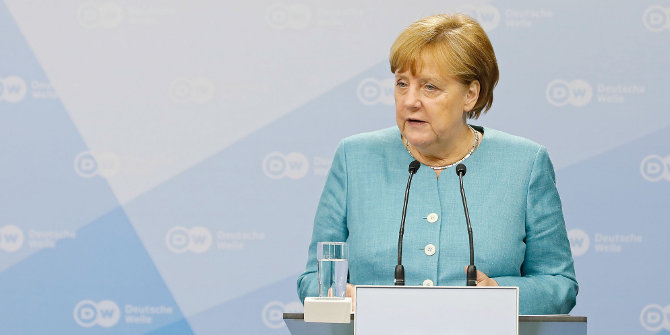How were Covid-19 policy measures implemented at different policy levels across Europe? Drawing on new research, Emma Martinez-Sanchez and Claudia Granaldi find evidence that many best practices emerged during the pandemic, especially in decentralised health systems and in research. Nevertheless, stronger and more sophisticated coordination is needed in decentralised health systems, and stable communication channels between health organisations and national policymaking forums remain crucial for facilitating science-based policy solutions. They also suggest the health of non-humans should be better integrated into healthcare systems.
“No issue is more important than people’s well-being”. These were the words of the President of the European Commission, Ursula von der Leyen, during the second global Covid-19 Summit on 13 May 2022. The sentence confirms the mindset of many countries during the pandemic: human lives first.
The high-level of restrictions in several European countries at the beginning of the pandemic, such as in Belgium and Portugal, were premised on saving the lives of those more at risk, particularly older people and clinically vulnerable patients who are more likely to have more severe complications from Covid-19. At a time when the corridors of the European institutions were echoing the call for a true European health union that could serve as a beacon for European countries, the truth is that the measures chosen by each member state differed.
But how were Covid-19 policy measures implemented at different governance levels? And how did they differ across Europe? In a study carried out as part of the Horizon 2020 PERISCOPE project, which focuses on the socio-economic impact of Covid-19, we have examined how multilevel governance worked during the pandemic from the perspective of four national academies of medicine.
The study, which was led by the Federation of European Academies of Medicine in consultation with a few member academies in their network, looked at four countries: the Netherlands, Spain, Italy, and the UK. With insights from policy staff at their national medical academies, we explored how the response at European, national regional and local levels took place, highlighting some best-practices and areas for improvement.
Our case study, published in this report, showed that the pandemic elicited spontaneous and innovative policy solutions at the regional level. Best practices flourished in response to communities’ needs, such as the swift communication system between geographically close intensive care units within the Madrid region, which allowed for the reallocation of patients from overflowing units to those with spare beds.
Our case study also highlights the importance of scientific support for pandemic preparedness. National multidisciplinary research initiatives contributed to pandemic preparedness and to avoid siloed working. In the Netherlands, the ‘Dutch Pandemic and Disaster Preparedness Centre’ and the ‘Red Team’ represent good examples of multidisciplinary collaboration.
Nevertheless, the regional pandemic response was not without challenges. Our evidence suggests that core governance was critical to the implementation and enforcement of pandemic policies. Unsurprisingly, we found structural differences between centralised and decentralised health systems. The pandemic was particularly caught in the latter, which usually delegates crisis management to regional authorities in need of more sophisticated coordination.
Coordination was particularly arduous at the earliest stages of the pandemic, and the rationale was that regional health authorities in decentralised health systems are less accustomed to coordinating as compared to centralised health systems. Specifically, decentralised health systems require stronger coordination at the local as well as at the transnational level for cross-border health threats. The core response to the pandemic suffered from broken communication between health organisations and national policy-making forums. In some cases, difficult communication resulted in the impossibility of translating timely scientific advice into policy.
Confirming the quote from the President of the European Commission at the beginning of this text, our study found that the health of non-humans received little consideration in the response to the pandemic. Instead, the urgency of the crisis led to the prioritisation of human health. This response seems surprising in light of the world’s growing call for One Health – a collaborative, multisectoral, and transdisciplinary approach that acknowledges the interconnected relationship between human, animal, and ecosystems health. This questionable response might have contributed to the creation of the brand-new One Health directorate in DG SANTE during its latest reorganisation in October this year.
Given this context, what solutions can multi-level policy offer? First, an EU mechanism that seeks to coordinate local and regional authorities in times of crisis can help European governance in the next unavoidable pandemic. Also, more stable and consistent communication channels could help bridge the gap between health and scientific associations and policymakers.
In this regard, our case study supports the development of a more comprehensive health policy debate at the European level. Nonetheless, enhancing the debate in Europe may not be sufficient, and public national platforms will be required to ensure prompt exchange of scientific information and evidence. Lastly, the health of non-humans can no longer be ignored: animal and ecosystem health need to become an integral part of healthcare management.
This article is part of a series summarising contributions to a PERISCOPE report on research on best practice in multi-level pandemic governance. The series brings together contributions from four organisations who have conducted interdisciplinary research as part of the EU Horizon 2020 PERISCOPE project: the London School of Economics, the Karolinska Institute, the Federation of European Academies of Medicine, and the Centre for European Policy Studies. For more information about PERISCOPE, please see the project’s website.
Note: This article gives the views of the authors, not the position of EUROPP – European Politics and Policy or the London School of Economics. Featured image credit: Giacomo Carra on Unsplash



